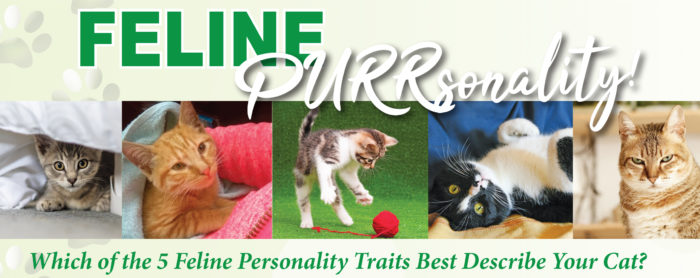
Cats and their purr-sonalities! Sometimes all cats are perceived as having the same type personality; aloof and standoffish, less social as our canine companions. Research is being done to help cat parents understand their cats better, improve their relationships, and create a happier and healthier home for their fur babies. According to Dr. Karen Becker, researchers have identified five personality traits that are very similar to our own. These are often called “The Feline Five” and they make up a cat’s purr-sonality. The traits include neurotic, extraverted, dominant, impulsive agreeable.
Every cat has their own distinctive purr-sonality or blend of “The Feline Five”. Identifying your cat’s personal blend of traits will help you be more in sync with your cat. It will also help you create a nurturing environment that is less stressful and more suited to their personality.
Skittish or neurotic cats are insecure, anxious, and fearful of new people and situations. They run and hide when visitors come over; they run in response to unknown noises. If your cat has this personality you want to create an environment for them where by feel safe. They need lots of places to hide such as tunnels, cat trees, or cardboard boxes. When you have visitors over make sure your cat can get to their favorite place of safety.
Cats with the extroversion traits are outgoing, extremely curious and get bored easily. These cats are always exploring and looking for new things to explore. They need extra mental stimulation and more enrichment activities than most cats. When their needs are not met they can get into trouble and develop destructive behaviors. Lots of interactive toys and active playtimes are essential to keep them entertained.Cats scoring high on dominance can be difficult and challenging especially with other cats in their home. They’re known as bullies and control their world; they don’t share food, toys and even block access to the kitty litter. Creating multiple feeding areas, having multiple kitty boxes and having extra toys will make life bearable for the other felines in the dominant cat’s home. Dominant cats often do best in a one-cat household but awareness of their bullying tendencies is important to ensure the safety and well being of your other cats.
An impulsive or spontaneous cat demonstrates erratic behaviors. They react differently to the same situation at different times. Researchers think that this type cat has difficulty coping with life. The cat may be having difficulty managing both high energy and anxiety which causes the erratic behavior. Consistency and routine with their feeding times and play times are important to help an impulsive cat manage his own behaviors.
Agreeableness – the friendly social cat who gets along with everyone and every pet. They are the ideal cat for a multi-cat home. This personality trait is often the result of a cat who was socialized as a kitten. An agreeable cat is friendly and shows affection. It is the opposite of the stereotypical “aloof” cat.
Understanding and appreciating your cat’s unique personality can deepen and strength the bond between you. If you are a multi-cat home or plan to add a new cat to your home it is important to be aware of the blended purr-sonalities within your feline family in order to create a home environment that meets the need of each feline family member.
Felines are a fascinating blend of personality traits… PURRsonality Plus! ©
